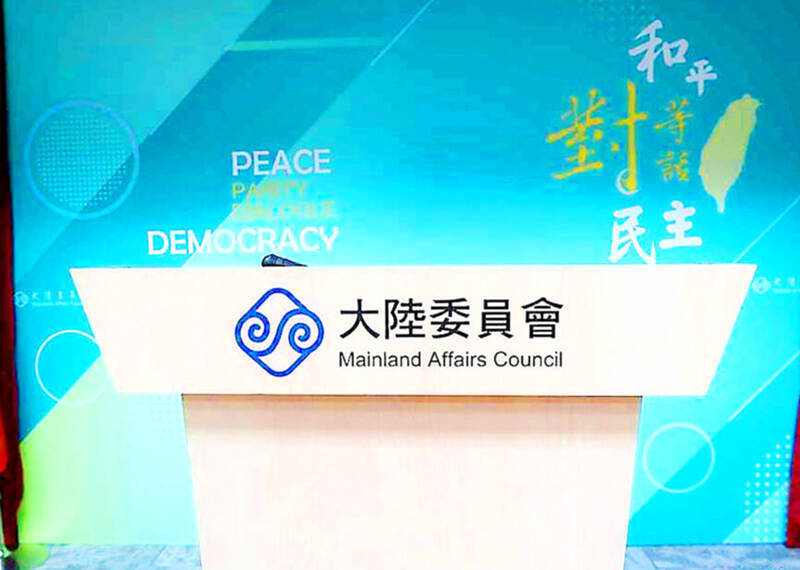Taiwanese judicial authorities continue to cooperate with China in combating crime and repatriation of convicted offenders, the Mainland Affairs Council (MAC) said in a report.
China has repatriated 511 wanted Taiwanese fugitives since the Cross-Strait Joint Crime-Fighting and Judicial Mutual Assistance Agreement (海峽兩岸共同打擊犯罪及司法互助協議) took effect in 2009, the report added.
Both countries have listed fighting cross-border smuggling of narcotic drugs, telecom fraud, cyberscam operations, endangerment of food and pharmaceutical safety, and human smuggling rings as their priorities, the report said.

Photo: Chung Li-hua, Taipei Times
The MAC said that Taiwan and China have cooperated to bust about 100 cases of narcotic drug smuggling since 2009, confiscating a total of 550.31kg of heroin, 2,438.8kg of amphetamine, 2,650.8kg of ephedrine for making illegal stimulants, 3,853kg of ketamine, 1,040kg of methcathinone, while the Coast Guard Administration reported seizing 10,128kg of narcotics and illegal drugs.
From 2019 to January this year, 24 offenders were repatriated from China, while Taiwan assisted in the return of a Chinese national surnamed Wang (王) in January, who is wanted as the primary suspect in a murder, the report said.
Taiwanese authorities have successfully clamped down on cross-border telecom fraud and cyberscam operations in Taiwan, China and Southeast Asia, by coordinating with agencies across government ministries, the report said, adding that they raided the largest money transfer and laundering center of these criminal rings in Taiwan in November 2016, whose offices were located in New Taipei City, as well as “underground banking” sites for cross-border scam rings in Hsinchu, Yilan and Nantou counties.
“As of January this year, Taiwanese and Chinese judiciary authorities have made official requests, sent and received official notifications, presented results of investigations and gathering evidence, and repatriated wanted criminals, accumulating a total of 140,000 pages of documentation,” the MAC said.
The Cross-Strait Joint Crime-Fighting and Judicial Mutual Assistance Agreement has been helpful in legal protection of personal rights during prosecution processes, and guarantees the right to property and assets of citizens in Taiwan and China, it added.

Taiwan has received more than US$70 million in royalties as of the end of last year from developing the F-16V jet as countries worldwide purchase or upgrade to this popular model, government and military officials said on Saturday. Taiwan funded the development of the F-16V jet and ended up the sole investor as other countries withdrew from the program. Now the F-16V is increasingly popular and countries must pay Taiwan a percentage in royalties when they purchase new F-16V aircraft or upgrade older F-16 models. The next five years are expected to be the peak for these royalties, with Taiwan potentially earning

STAY IN YOUR LANE: As the US and Israel attack Iran, the ministry has warned China not to overstep by including Taiwanese citizens in its evacuation orders The Ministry of Foreign Affairs (MOFA) yesterday rebuked a statement by China’s embassy in Israel that it would evacuate Taiwanese holders of Chinese travel documents from Israel amid the latter’s escalating conflict with Iran. Tensions have risen across the Middle East in the wake of US and Israeli airstrikes on Iran beginning Saturday. China subsequently issued an evacuation notice for its citizens. In a news release, the Chinese embassy in Israel said holders of “Taiwan compatriot permits (台胞證)” issued to Taiwanese nationals by Chinese authorities for travel to China — could register for evacuation to Egypt. In Taipei, the ministry yesterday said Taiwan

POSITIVE DEVELOPMENT: Japan and the US are expected to hold in-depth discussions on Taiwan-related issues during the meeting next month, Japanese sources said The holding of a Japan-US leaders’ meeting ahead of US President Donald Trump’s visit to China is positive news for Taiwan, former Japan-Taiwan Exchange Association representative Hiroyasu Izumi said yesterday. After the Liberal Democratic Party’s landslide victory in Japan’s House of Representatives election, Japanese Prime Minister Sanae Takaichi is scheduled to visit the US next month, where she is to meet with Trump ahead of the US president’s planned visit to China from March 31 to April 2 for a meeting with Chinese President Xi Jinping (習近平). Japan and the US are expected to hold in-depth discussions on Taiwan-related issues during the

‘LIKE-MINDED PARTNER’: Tako van Popta said it would be inappropriate to delay signing the deal with Taiwan because of China, adding he would promote the issue Canadian senators have stressed Taiwan’s importance for international trade and expressed enthusiasm for ensuring the Taiwan-Canada trade cooperation framework agreement is implemented this year. Representative to Canada Harry Tseng (曾厚仁) in an interview with the Central News Agency (CNA) said he was increasingly uneasy about Ottawa’s delays in signing the agreement, especially as Ottawa has warmed toward Beijing. There are “no negotiations left. Not only [is it] initialed, we have three versions of the text ready: English, French and Mandarin,” Tseng said. “That tells you how close we are to the final signature.” Tseng said that he hoped Canadian Prime Minister Mark Carney